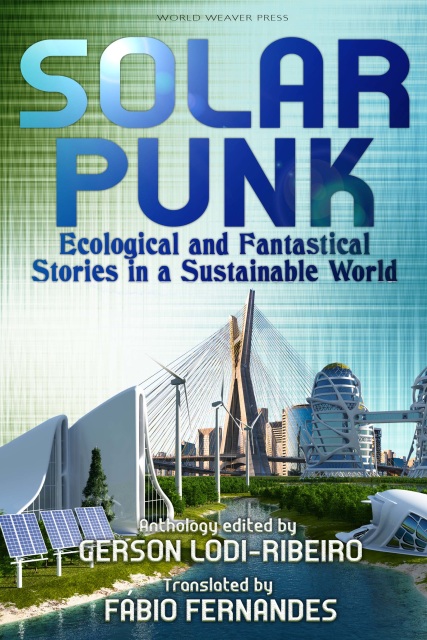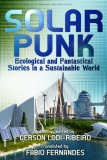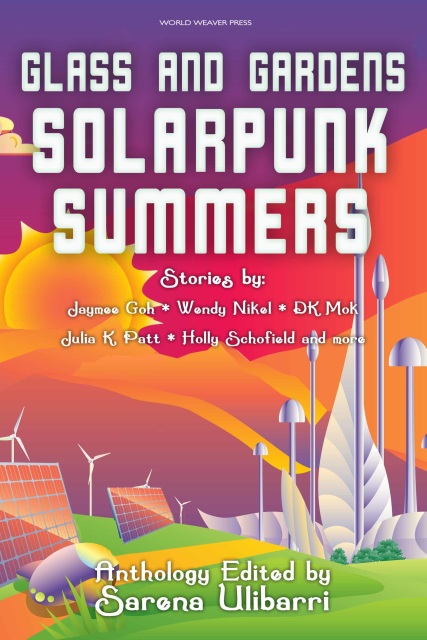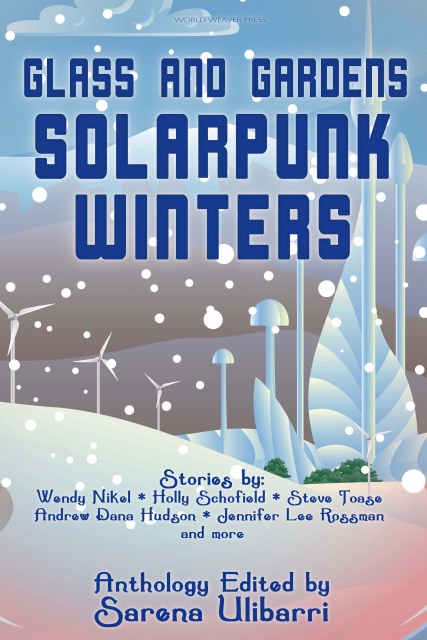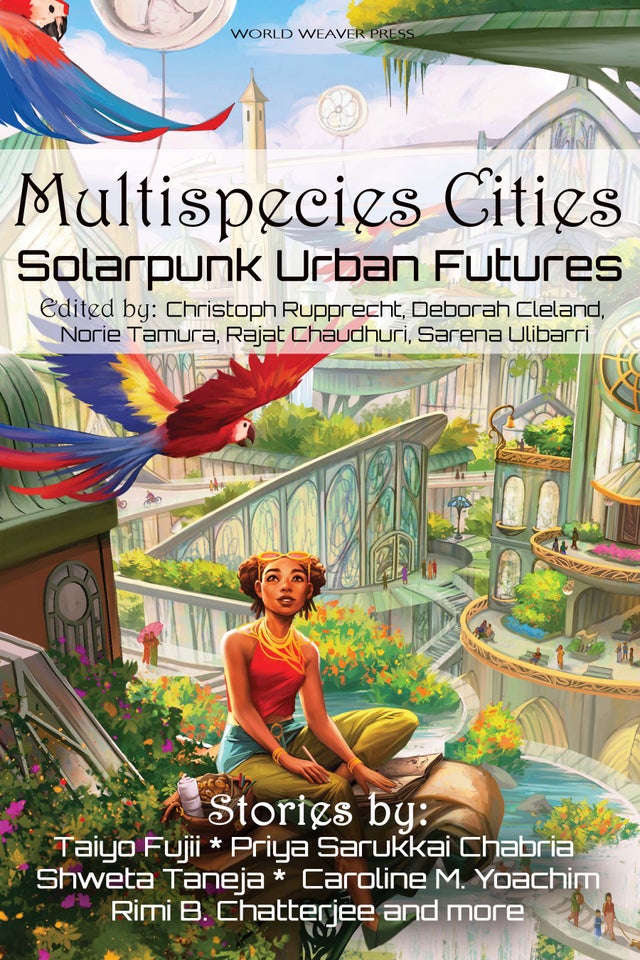- Store
- >
- Trade Paperback
- >
- Solarpunk: Ecological and Fantastical Stories in a Sustainable World
Solarpunk: Ecological and Fantastical Stories in a Sustainable World
SKU:
$14.95
$14.95
Unavailable
per item
The English translation of the world's first solarpunk anthology. Groundbreaking science fiction stories from Brazil and Portugal.
Anthology edited by Gerson Lodi-Ribeiro
Translated by Fabio Fernandes
Science Fiction / Short Story Anthology
Release Date: August 7, 2018
Trade Paperback
ISBN-13: 978-0998702292
Anthology: Approx. 82,000 words / 270 pages
Also available as an ebook
Find it Online:
Amazon
Barnes & Noble
Books-A-Million
Goodreads
Independent Bookstores
iTunes/Apple iBooks
Kobo
Overdrive
Wholesale: Ingram or direct: World Weaver Press.
Anthology edited by Gerson Lodi-Ribeiro
Translated by Fabio Fernandes
Science Fiction / Short Story Anthology
Release Date: August 7, 2018
Trade Paperback
ISBN-13: 978-0998702292
Anthology: Approx. 82,000 words / 270 pages
Also available as an ebook
Find it Online:
Amazon
Barnes & Noble
Books-A-Million
Goodreads
Independent Bookstores
iTunes/Apple iBooks
Kobo
Overdrive
Wholesale: Ingram or direct: World Weaver Press.
Sold Out
DescriptionImagine a sustainable world, run on clean and renewable energies that are less aggressive to the environment. Now imagine humanity under the impact of these changes. This is the premise Brazilian editor Gerson Lodi-Ribeiro proposed, and these authors took the challenge to envision hopeful futures and alternate histories. The stories in this anthology explore terrorism against green corporations, large space ships propelled by the pressure of solar radiation, the advent of photosynthetic humans, and how different society might be if we had switched to renewable energies much earlier in history. Originally published in Brazil and translated for the first time from the Portuguese by Fábio Fernandes, this anthology of optimistic science fiction features nine authors from Brazil and Portugal including Carlos Orsi, Telmo Marçal, Romeu Martins, Antonio Luiz M. Costa, Gabriel Cantareira, Daniel I. Dutra, André S. Silva, Roberta Spindler, and Gerson Lodi-Ribeiro.
Contents“Soylent Green is People!” by Carlos Orsi
“When Kingdoms Collide” by Telmo Marçal “Breaking News!” by Romeu Martins “Once Upon a Time in a World” by Antonio Luiz M. C. Costa “Escape” by Gabriel Cantareira “Gary Johnson” by Daniel I. Dutra “Xibalba Dreams of the West” by André S. Silva “Sun in the Heart” by Roberta Spindler “Cobalt Blue and the Enigma” by Gerson Lodi-Ribeiro Excerpt
From “Escape” by Gabriel Cantareira
São Paulo. Thursday, February 20th, 2031 — 4 PM Have you ever truly believed in something? So much that you had to risk everything, including your own life? The immensity of white concrete and glass skyscrapers invaded the blue skyline, as if it wanted to reach the clouds. In the summer, at four o’clock in the afternoon, the solar panels that covered the buildings and followed the movement of the sun throughout the day lined up so that what light could escape from the matrices of photoelectric cells was reflected in the direction of the Cairo building. From there the impression was that the new Avenida Paulista had turned into a celestial pathway, surrounded by towers of light. Mariana had always liked that view, but she had no time to enjoy it that day. She turned quickly and called the elevator impatiently. Some time later, the doors opened and she entered. She had to wait while other people walked in slowly, talking. She cursed softly when someone yelled for them to hold the door, and surprisingly the request was answered. Curious how the calm and patience of other people can sound like a personal insult when you don’t have time to lose. Nervous, she pressed her left hand, closed around the small memory card, to her chest. Getting it out of the building shouldn’t be so difficult, but making sure it arrived at its destination would be another story entirely. It didn’t help that she felt as if all the occupants of the elevator were watching her, that she would be caught at any moment. A few years ago, this task would have been easy. All she had to do was put the information on her PDA or mobile phone and the internet would do the rest, ensuring that anyone she wanted, anywhere in the world, would receive all the information contained in the card in a matter of minutes. Taking certain cautionary measures, it would be almost impossible to detect that specific data in the universe of information that was sent through the network every day. However, the internet was no longer what it used to be. Free flow of information is too dangerous a thing for governments and corporations. Taking into account that virtually all non-sensitive information was transmitted via the internet and that it was possible to be connected at any time and from any place, the mere fact of carrying a memory card seemed suspicious. The card also had a security measure that ensured that the data was erased at the original source after a possible transfer to maintain the uniqueness of the information. That is, she also could not create copies of the content to increase her chances. Not without the proper equipment. The elevator stopped at three more floors before reaching the ground floor. Finally, Mariana reached the main hall of the building, where busy people walked everywhere. She tried to blend in with the crowd and walk toward the exit. It would be difficult not to be recognized there, but the young woman hoped that when they realized that they should be behind her, she would be far away. As expected, some people greeted her, to which she just smiled and nodded nervously. Apparently, everything was still under control. Home Sweet Home. When she left the building, Mariana was greeted by the usual massive movement of the renovated center of São Paulo. The landscape from the top five minutes ago now loomed around her in detail: on the ground level of the imposing buildings covered with panels decorating the avenue, you could see the logos of the various corporations and companies that made their address: Solutions Solaris Technology, Advent Corporation, HSA Industries. Among the people on the sidewalks, dozens of armed guards with tactical equipment patrolled their beats. Luminous glass plates and OLED screens displayed advertisements of the city, large companies and their products. In one, a young black-haired girl appeared smiling while an HSA logo (which seemed to be the reason for so much glee) decorated the image. Mariana tried to ignore her surroundings and hurried to the Trianon-MASP subway integration station. Beautiful, clean and elegant, the new center of São Paulo comprised a large region, including old areas such as Bela Vista, Jardim Paulista, and Liberdade. Planned to be safe and almost self-sufficient in terms of energy, the place was described as the throbbing heart that injected new life into a city that saw its glory vanish a few years earlier. The third decade of the 2000s saw the world entering a new great war. The tensions generated by the nations’ desire to control fossil fuel reserves so they could ensure their future development led to ever-widening conflicts that eventually reached global scale. However, the war was less spectacular than predicted by the great philosophers and Hollywood writers: within two years most conflicts had ceased and almost no weapons of mass destruction had been used. Globalization can be a problem for militarism, since a nation’s civilian population will find it difficult to accept killing enemies who watch the same TV programs as they do. Well, war indeed changes things. About the Anthologist
Gerson Lodi-Ribeiro had two novelettes published in Brazilian Asimov’s: hard SF “Mythic Aliens” and “The Ethics of Treason”. The latter was the first alternative history story in Brazilian and Portuguese science fiction. His alternative history novelette “The Vampire of New Holland” won the Nova Awards 1996, while his SF novelette “The Daughter of the Predator” won the Nautilus 1999. His main short fiction collections are: Other Histories…, The Vampire of New Holland, Other Brazils, Taikodom: Chronicles and The Best of Carla Cristina Pereira. Gerson has published four novels so far: Xochiquetzal: An Aztec Princess Among the Incas, The Guardian of Memory, The Adventures of the Vampire of Palmares and Strangers in Paradise. He has edited eight short fiction anthologies so far: Phantastica Brasiliana, How Lustful my Alien Girl Was!, Vaporpunk, Dieselpunk, Solarpunk, Fantastic Erotica 1, Super-Heroes, and Dinosaurs. Beyond the science fiction borders, he published Vita Vinum Est!: History of Wine in the Roman World.
About the Translator
Fábio Fernandes lives in São Paulo, Brazil. He has published two books so far, an essay on William Gibson’s fiction, A Construção do Imaginário Cyber, and a cyberpunk novel, Os Dias da Peste (both in Portuguese). Also a translator, he is responsible for the translation to Brazilian Portuguese of several SF novels, including Neuromancer, Snow Crash, and A Clockwork Orange. His short stories have been published online in Brazil, Portugal, Romania, the UK, New Zealand, and USA, and also in Ann and Jeff VanderMeer’s Steampunk II: Steampunk Reloaded, Southern Fried Weirdness: Reconstruction (2011), The Apex Book of World SF, Vol 2, and Stories for Chip. He co-edited (with Djibril al-Ayad) the postcolonialist anthology We See a Different Frontier. He is a graduate of Clarion West, class of 2013.
|
More Like ThisPraise"Solarpunk is a wide-ranging collection of new Brazilian writing in translation, and for that by itself it would be a worthwhile read. That it tackles numerous aspects of and speculations on sustainable energy, renewable resources (or the lack thereof), and digital culture make it an incredibly pertinent volume for our world right now. Read it right this minute if you can; if you miss it, you might already be living in it…"
--The Future Fire "If you’re at all interested in speculative fiction about the environment and humanity’s future potential relationship with energy, you’ll definitely want to read Solarpunk." --SF in Translation "Solarpunk fiction appeals to contemporary audiences interested in science fiction with an ecofriendly theme. This anthology adds a nuanced and somewhat darker conceptualization to the genre, asking readers to consider the real possibility that the end of our environmental problems does not mean the end of human problems." --World Literature Today "While all of these stories are unique in their own ways, they all have a certain dark, grittiness about them. The detail in which clean energy is discussed is fascinating, but the secret conspiracies, space wars, and hidden agendas are the true draw to this anthology…“Solar Punk: Ecological and Fantastical Stories in a Sustainable World” provides nine slices of clean, ecologically friendly science fiction, whether your interests lie with technological thrillers or intergalactic warfare." —Reader Views "There is a wide range and very imaginative arrangement of stories that were surprising in how they tackled specific far-flung issues…I came away feeling overwhelmingly positive about it." --Consuming Cyberpunk "[D]elightfully diverse…Solarpunk contains everything from hardboiled noir to Lovecraftian lovechildren." --Miss Macross "Very, very interesting anthology overall both for the Brazil-centric POV of most of the stories as well as the solarpunk futuristic aspects." —K Bird Lincoln, author of DREAM EATER "None of these worlds are perfect—there are ecoterrorists, evil corporations, religious conflicts, and even vampires— but they all use renewable energy sources…For readers looking for new voices in sf and fans of international speculative fiction." —Booklist |

